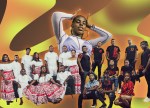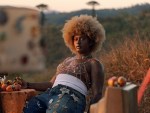If you were to be told that Afrobeat has been around since the 1960s, you’d be forgiven for thinking, “Oh wow, the genre of Afro B, Wizkid, Tems, Burna Boy, and more has been around for nearly seven decades?” Well, no, but the confusion is understandable. See, those artists instead sing Afrobeats. That single letter is enough to drastically change the context of the sound in ways that should be learned and appreciated despite how easy it is to mix one up with the other or conflate it as the same.
“Afrobeat,” sans s, is a genre of music that came up in the ‘60s and was pioneered by the legendary Fela Kuti himself. Kuti, a Nigerian musician widely considered one of the greatest performers of all time, combined traditional West African music with traits of American funk stylings to form a sound that soared to popularity during the ‘70s in Africa and abroad. Aside from its patriarch, Afrobeat had stars like the Lijadu Sisters during its 1970s heyday and is still a relevant genre today. Fela’s children have continued his legacy with sons Seun and Femi, as well as daughter Yeni, all continuing to keep his name and sound alive.
For its part, “Afrobeats,” plural, rose to popularity in the 2000s and especially 2010s off the strength of artists from Nigeria, Ghana, and diaspora communities such as in the U.K. For these reasons, much of the sound is a fusion of local genres like hiplife, naija, and afro-jùjú with British house, hip-hop, soca, and R&B. It boasts many artists who have achieved worldwide success, such as Davido, Rema, Fireboy DML, Tiwa Savage, and dozens more.
Some artists and producers have taken to refer to this contemporary genre as afro-pop to help sway the confusion with the original Afrobeat name, but the rapid spread of the music when it first became popular has cemented the term in many people, including artists who practice it — and even those who have emulated and appropriated it.

Recently, Spotify named “Latin Afrobeats” as one of its fastest-rising genres for 2025. While they point to the success of artists like Colombians Kapo and Hamilton and Honduran Key-Key, Latin American rappers have flirted with the genre since much earlier. On their joint album OASIS, megastars Bad Bunny and J Balvin teamed up with Nigerian artist Mr Eazi for the fun “COMO UN BEBÉ” that fully leaned into the Afrobeats vibe. A year later, Mr Eazi made another appearance on Balvin’s Colores LP. That same year, Ozuna hopped on the remix of Afro B’s international hit “Drogba (Joanna)” and added Latin American flavor (the remix is subtitled “Latin Global Version”.) Seemingly inspired, Ozuna released his own Afrobeats EP in 2023, titled — appropriately enough — Afro.
While some wondered why the crossover didn’t stick back when the first attempts were made, it seems those who said it was only a matter of time were proven right. Afrobeats remixes of popular releases are widely common nowadays, with even Benito’s DeBÍ TiRAR MáS FOToS getting the treatment.
But the confusion between the name persists, and the “afro-pop” solution doesn’t seem to be the salve many have hoped it’d be. Latin music has a complicated relationship when it comes to taking from African or Black genres — a relationship that veers into the controversial when white Latines do it. It was just over three years ago when J Balvin sparked outcry by accepting a “Best Afro-Latino Artist” award. And there are even examples of the potential for confusion when it comes to a Latine genre’s name. Dominican dembow takes its name from the Jamaican riddim (and Shabba Ranks song), which is the skeleton of nearly every reggaeton beat, but is rarely, if ever, used in the production of its songs.

The importance of differentiating between Afrobeat and Afrobeats isn’t trivial. Afrobeat was and continues to be one of the most influential genres of music in the world, not just in Africa. The music of Kuti and every other artist who followed him is still heard to this day, inspiring even Tony-winning musicals and Latine groups like Martín Perna’s Antibalas band in Brooklyn, Chilean ensemble Newen Afrobeat, and Colombia’s La BOA. Afrobeats is catchy, fun, at times political, and revolutionary in its own right — just like many of the genres that helped form it and give it life. It certainly deserves respect and admiration in its own right.
Hopefully, with time, guidance, and knowledge, artists and media can begin to be more diligent and responsible about calling them each by their correct name accordingly, despite the nuisance of the small variable between them. Neither Afrobeat nor Afrobeats are going anywhere, and so the small effort when talking about them is essential.
